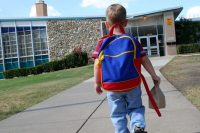Smooth Transitions

By now, most area schools have welcomed back the students from summer break. Our teachers returned to classrooms, hopefully refreshed, ready to inspire young minds. However, these seasons of change can pose challenges as kids get accustomed to new faces, classroom environments, rules and processes.
In order to ease these transitions, consider taking a Mindful Parenting approach:
- Get moving. Little (and big!) bodies need to move each day, and with less summertime natural play, it will be important to offer some unstructured time of play each day. This could mean kicking the ball in the front yard or going for a walk as a family.
- Provide nourishment. Not “food stuff” which may resemble food but is made primarily of chemicals and additives. Consider fresh fruits and veggies in a variety of colors, shapes and textures. The local farmer’s market can provide the family an experience of finding delicious options to keep our bodies working their best.
- Go to bed. Scientists continue to pump out the research indicating that a good night’s sleep is necessary to the fully-functioning human being. Help your child’s brain get into rest mode by powering down all electronic devices for an hour before bed – read a book, share about your day and spend time as a family.
- Keep goodbyes short and sweet. Younger children do best when caregivers lovingly and confidently escort them to school, give them a reassuring hug and allow them to join their classmates. Some children experience anxiety at the thought of leaving mom and dad for the day. It is important for parents to model to their children how to securely separate and come back together by staying positive and keeping parental emotion to a minimum (cry it out in the car!). Though it stems from good intentions, parental hovering actually leads to more child anxiety than it alleviates by giving the child the message there is something to be worried about.
Debrief the day. Time together in the evening is the most important part of any day. As a family, talk about the highs and lows, share what was learned, and work through the things that were difficult.This is where real learning happens.
By now, most area schools have welcomed back the students from summer break. Our teachers returned to classrooms, hopefully refreshed, ready to inspire young minds. However, these seasons of change can pose challenges as kids get accustomed to new faces, classroom environments, rules and processes.
In order to ease these transitions, consider taking a Mindful Parenting approach:
- Get moving. Little (and big!) bodies need to move each day, and with less summertime natural play, it will be important to offer some unstructured time of play each day. This could mean kicking the ball in the front yard or going for a walk as a family.
- Provide nourishment. Not “food stuff” which may resemble food but is made primarily of chemicals and additives. Consider fresh fruits and veggies in a variety of colors, shapes and textures. The local farmer’s market can provide the family an experience of finding delicious options to keep our bodies working their best.
- Go to bed. Scientists continue to pump out the research indicating that a good night’s sleep is necessary to the fully-functioning human being. Help your child’s brain get into rest mode by powering down all electronic devices for an hour before bed – read a book, share about your day and spend time as a family.
- Keep goodbyes short and sweet. Younger children do best when caregivers lovingly and confidently escort them to school, give them a reassuring hug and allow them to join their classmates. Some children experience anxiety at the thought of leaving mom and dad for the day. It is important for parents to model to their children how to securely separate and come back together by staying positive and keeping parental emotion to a minimum (cry it out in the car!). Though it stems from good intentions, parental hovering actually leads to more child anxiety than it alleviates by giving the child the message there is something to be worried about.
Debrief the day. Time together in the evening is the most important part of any day. As a family, talk about the highs and lows, share what was learned, and work through the things that were difficult.This is where real learning happens.

